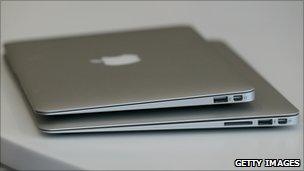Piracy concerns over Apple's new Mac download store
- Published

The Mac App Store offers programs for computers including the Macbook Air
Pirates have targeted Apple's new software download service just one day after it launched.
Several groups claim to have found security flaws in the company's new Mac App Store, which launched on Thursday.
The new service allows people to find and download approved applications to their Apple computers.
However pirates suggest that the loopholes mean many pieces of paid-for software are vulnerable to unauthorised copying.
Apple chief executive Steve Jobs had hailed the launch as "innovative", but the company has yet to respond to the claims.
While Mac users have been able to purchase and install programs on their computers for many years, the Californian technology giant hopes the new system can emulate the success of its music and mobile download services.
The store has more than 1,000 programs for download, including best sellers such as Angry Birds.
Apple scrutiny
Unlike ordinary software downloads, however, every program in the store is scrutinised by Apple and must pass a series of tests before gaining approval.
Almost immediately after the launch, however, pirates and Apple experts outlined a series of loopholes that could allow software to be copied or shared illegally.
One flaw, which only affects some applications including the popular Angry Birds game, involves simply copying and pasting the purchase code to allow paid-for programs to be used for free.
At the same time, a group known as Hackulous says it has developed a program called Kickback which can break the protection on any piece of App Store software.
However the organisation, which has previously broken the copy protection systems used by the iPhone and iPad, says it will not release its work until next month.
"We're not going to release Kickback until well after the store's been established," said "Dissident", a spokesman for the group. "We don't want to devalue applications and frustrate developers."
Google battle
Although Apple's approval process is intended to boost security, prominent blogger John Gruber - who writes , externalextensively about the company - said the loopholes showed gaps in the system.
"Apple should test for this in the review process, and reject paid apps that are susceptible to this simple technique," he wrote.
In the past the company has come under fire for the opaque nature of its approval scheme, which has sometimes resulted in applications being blocked without an obvious reason.
Most notably Google complained after its Voice application for the iPhone was turned down. It was eventually given approval, but only after a protracted battle between the two companies.
The news also comes after it emerged that as many as 50,000 fraudulently-obtained iTunes accounts were for sale on Chinese auction site TaoBao.
- Published5 January 2011
- Published29 December 2010
- Published22 December 2010